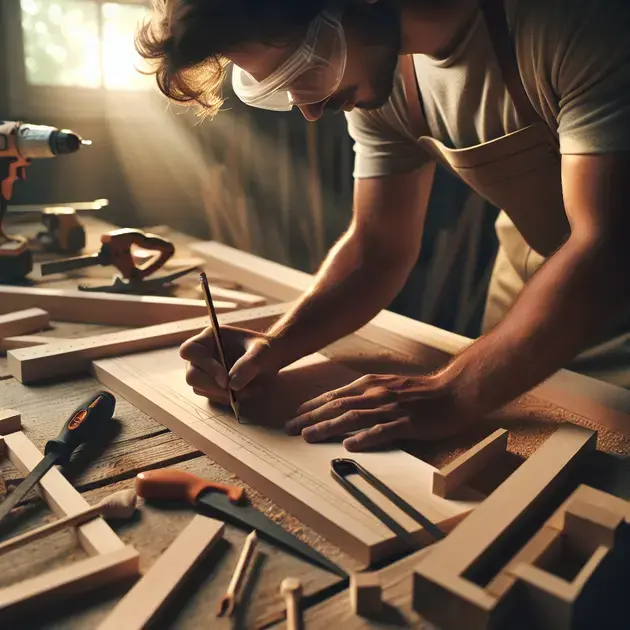Woodworking is a fascinating craft that allows individuals to create beautiful and functional items from wood. For beginners interested in mastering the art of woodworking, there are a plethora of tips and techniques to learn and practice. From selecting the right type of wood to mastering essential tools and safety practices, embarking on this woodworking journey can be both rewarding and fulfilling.
One key aspect of mastering woodworking as a beginner is understanding the importance of precision and patience in each project. By paying attention to details, following step-by-step instructions, and honing essential woodworking skills, beginners can gradually improve their craftsmanship and create stunning pieces. Whether it’s learning how to properly measure and cut wood or mastering techniques like joinery and finishing, each new skill acquired brings them closer to becoming adept woodworkers.

Choosing the Right Tools and Materials
When starting a new project, one of the key tips for beginners is to choose the right tools and materials. This step is crucial for the success of your endeavor, as using the right equipment can make the process smoother and the final result more professional. Here are some steps to help you choose the right tools and materials:
Research and Recommendations
Start by researching the tools and materials needed for your specific project. Websites like Home Depot or Lowe’s offer detailed information on various tools and materials, including reviews and recommendations from other users. You can also join online forums or communities related to your project to get advice from experienced individuals.
Compare Prices and Quality
Once you have a list of potential tools and materials, compare prices and quality. Websites like Amazon or Walmart offer a wide range of products at different price points. Consider reading reviews and looking for feedback on the quality of the tools and materials to ensure you are making a good investment.
Visit Local Stores
If possible, visit local stores to see the tools and materials in person. This will give you a better idea of the size, weight, and feel of the items. Additionally, talking to store associates can help you gather more information and tips on using the tools effectively.
Check for Discounts and Deals
Before making a purchase, check for discounts and deals on tools and materials. Websites like RetailMeNot or Honey offer coupon codes and deals for various stores. Signing up for newsletters from your favorite stores can also keep you informed about upcoming sales and promotions.
Read Instructions and Manuals
Lastly, always remember to read the instructions and manuals that come with the tools and materials. Websites like the manufacturer’s official website or YouTube channels often provide video tutorials on how to use the tools correctly for optimal results.
Developing Precision and Patience
Another important aspect for beginners to focus on is developing precision and patience in their projects. These qualities are essential for achieving high-quality results and mastering the craft. Here are some steps to help you develop precision and patience:
Practice Regularly
Practice is key to developing precision and patience. Websites like Skillshare or Udemy offer online courses and tutorials on various skills and techniques. Investing time in regular practice sessions can help improve your precision and patience over time.
Start with Small Projects
Beginners should start with small projects to hone their skills. Websites like Pinterest or Instructables offer DIY project ideas that are perfect for beginners. Starting small allows you to focus on the details and gradually build your precision and patience.
Use Guides and Templates
Utilize guides and templates to help you improve your precision. Websites like Canva or Template.net offer a wide range of design templates and guides for various projects. By following these guides, you can learn techniques for precise measurements and attention to detail.
Set Realistic Goals
Set realistic goals for your projects to practice patience. Websites like Trello or Todoist can help you create project timelines and task lists. Breaking down your project into smaller tasks and setting achievable deadlines can keep you motivated and patient throughout the process.
Seek Feedback and Learn from Mistakes
Lastly, seek feedback from experienced individuals and learn from your mistakes. Joining workshops or forums like Reddit or Quora can help you connect with others in your field. Constructive criticism and acknowledging your mistakes can help you improve your precision and patience in future projects.

Essential Safety Measures in Woodworking
Woodworking can be a fulfilling and enjoyable activity, but it is important to prioritize safety at all times. Implementing essential safety measures is crucial to prevent accidents and injuries in the workshop.
One of the most important safety measures in woodworking is to always wear appropriate personal protective equipment (PPE). This includes safety glasses, hearing protection, a dust mask, and work gloves. PPE helps to protect your eyes, ears, lungs, and hands from potential hazards such as flying wood chips, loud noises, dust, and splinters.
Another essential safety measure is to keep your work area clean and organized. Cluttered workspaces can increase the risk of accidents, so it is important to regularly clean up sawdust, wood scraps, and other debris. Additionally, make sure that power tools are properly maintained and in good working condition to avoid malfunctions.
It is also crucial to familiarize yourself with the proper operation of each woodworking tool before using it. Always read the manufacturer’s instructions, and never attempt to use a tool if you are unsure of how to operate it safely. Furthermore, be mindful of your body positioning and hand placement while using power tools to reduce the risk of accidents.
Lastly, never work with dull tools, as they can be more dangerous than sharp ones. Keep your cutting tools sharp and well-maintained to ensure clean and precise cuts. By following these essential safety measures, you can enjoy woodworking with peace of mind knowing that you are taking the necessary precautions to stay safe.
Mastering the Basics of Wood Selection
Choosing the right type of wood is essential for the success of any woodworking project. Understanding the basics of wood selection can help you achieve the desired outcome and create high-quality pieces that stand the test of time.
When selecting wood for a project, consider the type of wood species that align with your design aesthetics and functional requirements. Different wood species have unique characteristics in terms of color, grain pattern, hardness, and durability, so choose a wood that suits your project’s needs.
It is also important to consider the moisture content of the wood, as wood that is too wet or too dry can lead to issues such as warping, splitting, or joint failure. Use a moisture meter to check the moisture content of the wood before starting your project and make any necessary adjustments.
Furthermore, pay attention to the cut and grain orientation of the wood, as this can affect the strength and stability of the final piece. Understanding how different cuts, such as rift-sawn, quarter-sawn, and plain-sawn, impact the wood’s appearance and performance can help you make informed decisions during the wood selection process.
Lastly, consider the cost and availability of the wood species you are considering. Some exotic woods may be more expensive and harder to find, while domestic species are more readily available and budget-friendly. By mastering the basics of wood selection, you can choose the right wood for your project and achieve professional results.
Creating Beautiful Wood Joints
Wood joints are an essential aspect of woodworking that not only provide structural integrity but also contribute to the aesthetic appeal of a piece. Mastering the art of creating beautiful wood joints can elevate your woodworking skills and allow you to create intricate and durable connections.
One of the most common wood joints is the dovetail joint, known for its strength and decorative appeal. To create a dovetail joint, precision and accuracy are key, as the interlocking pins and tails must fit together snugly for a tight bond. Practice and patience are essential when mastering dovetail joints.
Another popular wood joint is the mortise and tenon joint, which is versatile and strong. This joint consists of a square or rectangular hole (mortise) in one piece of wood that receives a corresponding projection (tenon) on another piece. Careful measurement and precise cutting are necessary to ensure a tight fit.
For more decorative joints, consider exploring options such as box joints, finger joints, or half-lap joints. These joints add visual interest to your projects and can enhance the overall design. Experimenting with different joint styles and techniques can help you expand your woodworking skills and create unique pieces.
Regardless of the type of wood joint you choose, attention to detail and craftsmanship are essential for achieving beautiful results. Take the time to practice and perfect your joint-making skills, and soon you will be creating flawless and stunning connections in your woodworking projects.
Conclusion
In conclusion, prioritizing essential safety measures in woodworking is paramount to ensure a secure and enjoyable workshop environment. By wearing proper personal protective equipment, maintaining a clean workspace, understanding tool operation, and using sharp tools, woodworkers can significantly reduce the risk of accidents and injuries.
Mastering the basics of wood selection is crucial for the success of woodworking projects. Considering factors such as wood species, moisture content, cut, grain orientation, cost, and availability can lead to the creation of high-quality pieces that fulfill both functional and aesthetic requirements.
Lastly, creating beautiful wood joints not only enhances the structural integrity of woodworking projects but also adds visual appeal. By mastering joints like dovetail, mortise and tenon, and exploring decorative options such as box joints or finger joints, woodworkers can elevate their craft and produce unique and stunning pieces through attention to detail and craftsmanship.
.